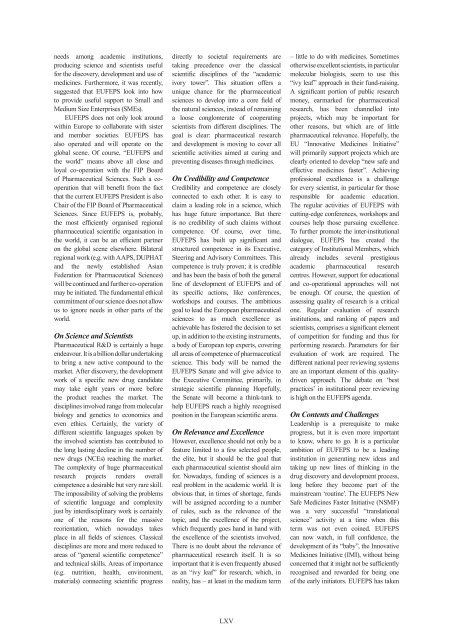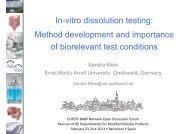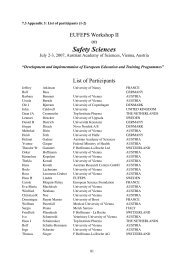2011 Anniversary Yearbook - EUFEPS today and history
2011 Anniversary Yearbook - EUFEPS today and history
2011 Anniversary Yearbook - EUFEPS today and history
You also want an ePaper? Increase the reach of your titles
YUMPU automatically turns print PDFs into web optimized ePapers that Google loves.
needs among academic institutions,<br />
producing science <strong>and</strong> scientists useful<br />
for the discovery, development <strong>and</strong> use of<br />
medicines. Furthermore, it was recently,<br />
suggested that <strong>EUFEPS</strong> look into how<br />
to provide useful support to Small <strong>and</strong><br />
Medium Size Enterprises (SMEs).<br />
<strong>EUFEPS</strong> does not only look around<br />
within Europe to collaborate with sister<br />
<strong>and</strong> member societies. <strong>EUFEPS</strong> has<br />
also operated <strong>and</strong> will operate on the<br />
global scene. Of course, “<strong>EUFEPS</strong> <strong>and</strong><br />
the world” means above all close <strong>and</strong><br />
loyal co-operation with the FIP Board<br />
of Pharmaceutical Sciences. Such a cooperation<br />
that will benefit from the fact<br />
that the current <strong>EUFEPS</strong> President is also<br />
Chair of the FIP Board of Pharmaceutical<br />
Sciences. Since <strong>EUFEPS</strong> is, probably,<br />
the most efficiently organised regional<br />
pharmaceutical scientific organisation in<br />
the world, it can be an efficient partner<br />
on the global scene elsewhere. Bilateral<br />
regional work (e.g. with AAPS, DUPHAT<br />
<strong>and</strong> the newly established Asian<br />
Federation for Pharmaceutical Sciences)<br />
will be continued <strong>and</strong> further co-operation<br />
may be initiated. The fundamental ethical<br />
commitment of our science does not allow<br />
us to ignore needs in other parts of the<br />
world.<br />
On Science <strong>and</strong> Scientists<br />
Pharmaceutical R&D is certainly a huge<br />
endeavour. It is a billion dollar undertaking<br />
to bring a new active compound to the<br />
market. After discovery, the development<br />
work of a specific new drug c<strong>and</strong>idate<br />
may take eight years or more before<br />
the product reaches the market. The<br />
disciplines involved range from molecular<br />
biology <strong>and</strong> genetics to economics <strong>and</strong><br />
even ethics. Certainly, the variety of<br />
different scientific languages spoken by<br />
the involved scientists has contributed to<br />
the long lasting decline in the number of<br />
new drugs (NCEs) reaching the market.<br />
The complexity of huge pharmaceutical<br />
research projects renders overall<br />
competence a desirable but very rare skill.<br />
The impossibility of solving the problems<br />
of scientific language <strong>and</strong> complexity<br />
just by interdisciplinary work is certainly<br />
one of the reasons for the massive<br />
reorientation, which nowadays takes<br />
place in all fields of sciences. Classical<br />
disciplines are more <strong>and</strong> more reduced to<br />
areas of “general scientific competence”<br />
<strong>and</strong> technical skills. Areas of importance<br />
(e.g. nutrition, health, environment,<br />
materials) connecting scientific progress<br />
directly to societal requirements are<br />
taking precedence over the classical<br />
scientific disciplines of the “academic<br />
ivory tower”. This situation offers a<br />
unique chance for the pharmaceutical<br />
sciences to develop into a core field of<br />
the natural sciences, instead of remaining<br />
a loose conglomerate of cooperating<br />
scientists from different disciplines. The<br />
goal is clear: pharmaceutical research<br />
<strong>and</strong> development is moving to cover all<br />
scientific activities aimed at curing <strong>and</strong><br />
preventing diseases through medicines.<br />
On Credibility <strong>and</strong> Competence<br />
Credibility <strong>and</strong> competence are closely<br />
connected to each other. It is easy to<br />
claim a leading role in a science, which<br />
has huge future importance. But there<br />
is no credibility of such claims without<br />
competence. Of course, over time,<br />
<strong>EUFEPS</strong> has built up significant <strong>and</strong><br />
structured competence in its Executive,<br />
Steering <strong>and</strong> Advisory Committees. This<br />
competence is truly proven; it is credible<br />
<strong>and</strong> has been the basis of both the general<br />
line of development of <strong>EUFEPS</strong> <strong>and</strong> of<br />
its specific actions, like conferences,<br />
workshops <strong>and</strong> courses. The ambitious<br />
goal to lead the European pharmaceutical<br />
sciences to as much excellence as<br />
achievable has fostered the decision to set<br />
up, in addition to the existing instruments,<br />
a body of European top experts, covering<br />
all areas of competence of pharmaceutical<br />
science. This body will be named the<br />
<strong>EUFEPS</strong> Senate <strong>and</strong> will give advice to<br />
the Executive Committee, primarily, in<br />
strategic scientific planning Hopefully,<br />
the Senate will become a think-tank to<br />
help <strong>EUFEPS</strong> reach a highly recognised<br />
position in the European scientific arena.<br />
On Relevance <strong>and</strong> Excellence<br />
However, excellence should not only be a<br />
feature limited to a few selected people,<br />
the elite, but it should be the goal that<br />
each pharmaceutical scientist should aim<br />
for. Nowadays, funding of sciences is a<br />
real problem in the academic world. It is<br />
obvious that, in times of shortage, funds<br />
will be assigned according to a number<br />
of rules, such as the relevance of the<br />
topic, <strong>and</strong> the excellence of the project,<br />
which frequently goes h<strong>and</strong> in h<strong>and</strong> with<br />
the excellence of the scientists involved.<br />
There is no doubt about the relevance of<br />
pharmaceutical research itself. It is so<br />
important that it is even frequently abused<br />
as an “ivy leaf” for research, which, in<br />
reality, has – at least in the medium term<br />
LXV<br />
– little to do with medicines. Sometimes<br />
otherwise excellent scientists, in particular<br />
molecular biologists, seem to use this<br />
“ivy leaf” approach in their fund-raising.<br />
A significant portion of public research<br />
money, earmarked for pharmaceutical<br />
research, has been channelled into<br />
projects, which may be important for<br />
other reasons, but which are of little<br />
pharmaceutical relevance. Hopefully, the<br />
EU “Innovative Medicines Initiative”<br />
will primarily support projects which are<br />
clearly oriented to develop “new safe <strong>and</strong><br />
effective medicines faster”. Achieving<br />
professional excellence is a challenge<br />
for every scientist, in particular for those<br />
responsible for academic education.<br />
The regular activities of <strong>EUFEPS</strong> with<br />
cutting-edge conferences, workshops <strong>and</strong><br />
courses help those pursuing excellence.<br />
To further promote the inter-institutional<br />
dialogue, <strong>EUFEPS</strong> has created the<br />
category of Institutional Members, which<br />
already includes several prestigious<br />
academic pharmaceutical research<br />
centres. However, support for educational<br />
<strong>and</strong> co-operational approaches will not<br />
be enough. Of course, the question of<br />
assessing quality of research is a critical<br />
one. Regular evaluation of research<br />
institutions, <strong>and</strong> ranking of papers <strong>and</strong><br />
scientists, comprises a significant element<br />
of competition for funding <strong>and</strong> thus for<br />
performing research. Parameters for fair<br />
evaluation of work are required. The<br />
different national peer reviewing systems<br />
are an important element of this qualitydriven<br />
approach. The debate on ‘best<br />
practices’ in institutional peer reviewing<br />
is high on the <strong>EUFEPS</strong> agenda.<br />
On Contents <strong>and</strong> Challenges<br />
Leadership is a prerequisite to make<br />
progress, but it is even more important<br />
to know, where to go. It is a particular<br />
ambition of <strong>EUFEPS</strong> to be a leading<br />
institution in generating new ideas <strong>and</strong><br />
taking up new lines of thinking in the<br />
drug discovery <strong>and</strong> development process,<br />
long before they become part of the<br />
mainstream ‘routine’. The <strong>EUFEPS</strong> New<br />
Safe Medicines Faster Initiative (NSMF)<br />
was a very successful “translational<br />
science” activity at a time when this<br />
term was not even coined. <strong>EUFEPS</strong><br />
can now watch, in full confidence, the<br />
development of its “baby”, the Innovative<br />
Medicines Initiative (IMI), without being<br />
concerned that it might not be sufficiently<br />
recognised <strong>and</strong> rewarded for being one<br />
of the early initiators. <strong>EUFEPS</strong> has taken




